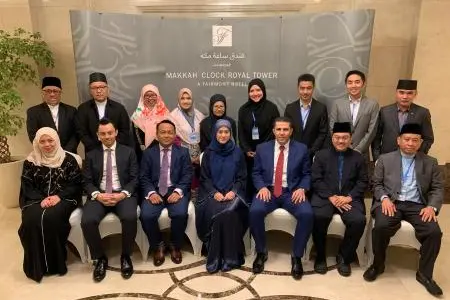PHOTO
Makkah: An Executive Islamic Finance Training Workshop for officials from various Brunei financial institutions has began in Makkah, Kingdom of Saudi Arabia, organized jointly by the Islamic Research and Training Institute (IRTI) and Brunei’s Centre for Islamic Banking, Finance and Management (CIBFM), with support from Autoriti Monetari Brunei Darussalam (AMBD).
The five-day workshop, from 28 April to 2 May 2019, will discuss various topics and contemporary issues in Islamic Finance, including prospects of FinTech for the Islamic financial industry, Islamic modes of financing, Sukuk structures in a global context, Islamic social finance, and legal frameworks.
Other areas will include resource mobilization through Islamic Finance, ethical investments, legal and taxation issues in Islamic financial contracts under different jurisdictions, and monetary policy in a dual banking system.
Fourteen participants are attending the workshop from different financial institutions in Brunei, consisting of regulators, Shari’ah advisors, financial industry operators and academics.
In a speech at the opening of the program, IRTI’s acting manager of training, Dr. Rami Abdelkafi, spoke of the significance of the cooperation between IRTI and CIBFM. He explained that the workshop was specifically customized for the officials from Brunei, and that the training sessions would be delivered by some of the best scholars in the Islamic financial industry.
In her speech, Dayang Hajah Sufinah binti Haji Sahat, Acting Chief Executive Officer of CIBFM, expressed her appreciation for the cooperation with IRTI in organizing the training workshop. She added that the workshop will provide the Brunei officials with advanced knowledge to confront contemporary challenges and new trends in the Islamic finance industry.
-Ends-
About IRTI:
The Islamic Research and Training Institute (IRTI) is a Member of the Islamic Development Bank (IsDB) Group responsible for knowledge creation and dissemination in Islamic Economics and Finance, and fostering the use of Islamic Finance to contribute to the sustainable development of IsDB member countries. More information about IRTI is available on www.irti.org. For enquiries about IRTI, please contact Habeeb Idris Pindiga (hpindiga@isdb.org).
About CIBFM:
CIBFM is a training institution under the purview of Autoriti Monetari Brunei Darussalam (AMBD) which plays an important role in developing the human capacity in the areas of Islamic banking, finance and management. For more information on CIBFM and its learning and development programme, please visit the CIBFM website at www.cibfmbrunei.com, the CIBFM Facebook account at CIBFMBrunei or through CIBFM Instagram @cibfm.brunei.
Disclaimer: The contents of this press release was provided from an external third party provider. This website is not responsible for, and does not control, such external content. This content is provided on an “as is” and “as available” basis and has not been edited in any way. Neither this website nor our affiliates guarantee the accuracy of or endorse the views or opinions expressed in this press release.
The press release is provided for informational purposes only. The content does not provide tax, legal or investment advice or opinion regarding the suitability, value or profitability of any particular security, portfolio or investment strategy. Neither this website nor our affiliates shall be liable for any errors or inaccuracies in the content, or for any actions taken by you in reliance thereon. You expressly agree that your use of the information within this article is at your sole risk.
To the fullest extent permitted by applicable law, this website, its parent company, its subsidiaries, its affiliates and the respective shareholders, directors, officers, employees, agents, advertisers, content providers and licensors will not be liable (jointly or severally) to you for any direct, indirect, consequential, special, incidental, punitive or exemplary damages, including without limitation, lost profits, lost savings and lost revenues, whether in negligence, tort, contract or any other theory of liability, even if the parties have been advised of the possibility or could have foreseen any such damages.




















